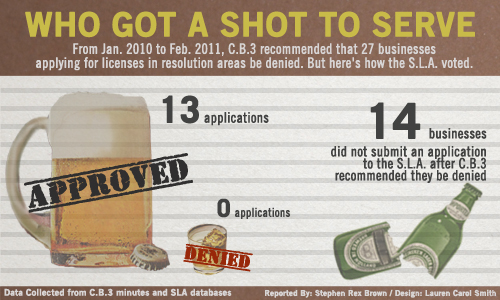A tipster spotted this sign affixed to Spanky & Darla’s. The health department notice, dated Oct. 3, indicates the bar was closed for operating without a permit.
It’s not the first time the dive at 140 First Avenue has been forcibly shut down. In 2010, the bar’s predecessor, Cheap Shots, was closed after underage drinking busts and fighting caused it to be declared a “public nuisance,” a police department attorney told NYC the Blog.
During its time as Cheap Shots, the bar had to pay a total of $11,000 for offenses that included sales to minors, unlicensed security guards, and unlimited drinks specials, according to State Liquor Authority records.
The Liquor Authority’s Website indicates that a liquor license for the establishment was recently renewed, and activated on Oct. 1, 2012. The premises name and trade name are listed as Cheapshots rather than Spanky & Darla’s.
In May, Big Apple Reviews called the bar “a great place to go for a low-key night to just get some drinks, or get plastered before painting the town red.”
 Daniel Maurer Zaragoza.
Daniel Maurer Zaragoza.Zaragoza’s nearly year-long quest for a beer and wine license is entering the final stretch.
Ruben Martinez, one of the deli’s owners, confirmed that the family-owned business will soon go before the State Liquor Authority after filing missing paperwork with Community Board 3.
“It was my fault. I had other things on my mind and I didn’t sign it off,” Mr. Martinez said of the documents that agreed to a series of community board stipulations. “It was just dropped off a week later and it wasn’t on time.”
For Zaragoza, the dry spell began last July when its alcohol license expired. The family failed to renew it and, a month later, they were charged for selling beer with an expired license. (It didn’t help that they sold the alcohol to a minor, either).
Read more…
 Edna Ishayik
Edna IshayikCommunity Board 3 may have set a record last night: with 27 items on the agenda – including Ninth Street Espresso’s bid to serve beer, a pitch for a German beer hall on the Bowery, and a Starbucks location’s attempt to win back its sidewalk seats – the board’s State Liquor Authority committee meeting ran past 2 a.m.
The main event: the owners of B-Side are hoping to open a spot at East Broadway and Clinton Street that would be “totally different” than the punk bar on Avenue B and would include a chip shop purveying “the best fish, chips and falafel you’ve ever had,” according to owner Sivan Harlap.
In an e-mail, Ms. Harlap called the new venture a “grown-up version of B-side,” explaining that “there are things I am interested in now that I wasn’t that all interested in when I was 22 – craft beers, cocktails, thoughtful food, this new place will reflect those new interests.”
Speakers lined up to argue in favor and against the new watering hole that would be catty-corner to the Seward Park Cooperative. Some neighbors said they looked forward to having a place to grab a drink or a bite in an area that isn’t laden with bars and restaurants. But opponents, some of whom were concerned about loud noise, had collected over 600 signatures, partially through churches and schools nearby. Read more…
 Natalie Rinn Susan Stetzer points at documents as S.L.A.
Natalie Rinn Susan Stetzer points at documents as S.L.A.
committee chair Alexandra Militano leafs through them.Before finalizing a controversial set of stipulations that would ease Community Board 3’s stance against new beer-and-wine licenses in nightlife-heavy areas – so long as applicants agree to close shop early – a task force decided last night to seek counsel from a higher power: the State Liquor Authority.
During a meeting at C.B. 3’s offices last night, District Manager Susan Stetzer said that the board should repair a feeling that it is particularly unbending, shared by applicants and the S.L.A. alike. “We have become infamous,” she said, explaining that applicants’ lawyers approach the S.L.A. and say, “C.B. 3 has a moratorium [on new licenses in resolutions areas], and it’s illegal” – a sentiment with which S.L.A. chair Dennis Rosen agrees, according to Ms. Stetzer. “We are losing respect and clout,” she said. Read more…
 Michelle Rick
Michelle RickCommunity Board 3 may reverse its hardline stance against new beer-and-wine licenses in booze-heavy areas of the East Village and Lower East Side. In a letter to residents, the board will ask whether it should be more lenient to those seeking such licenses within resolution areas, so long as the businesses agree to operate primarily in the daytime and close at midnight or earlier.
The move comes just a few months after The Local unleashed a sobering study showing that the State Liquor Authority regularly disregards the board’s recommendations regarding who should or shouldn’t be allowed to serve wine and beer (as opposed to hard liquor) in resolution areas – nightlife-heavy strips such as St. Marks Place where the board has recommended a moratorium on new licenses.
At a meeting of the SLA task force last night, board member David Crane described the motivation behind the potential policy shift. “The SLA generally is going to grant a beer-wine license,” he said. “Since that’s a reality, we’re interested in preventing problems. We want to work with the SLA given that that’s a fact.” Read more…
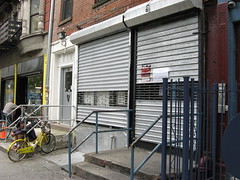 Stephen Rex Brown
Stephen Rex BrownAfter abruptly shuttering during the summer and moving its parties to the basement of Lucky Cheng’s, Nublu will reopen at its original Avenue C location, serving beer and wine rather than hard liquor.
E-mailing from Sweden, Nublu’s owner, Ilhan Ersahin, said that the club would reopen tonight at 62 Avenue C and will once again operate from 8 p.m. till 4 a.m. nightly, but will now host earlier shows at lower volumes. He described the new operation as “less clubby style,” with “more wine/lounge/art/talky kinda vibes,” and said that finger food would be served. He added that there would be “more acoustic-friendly nights, neighborhood-style, with an international touch” in keeping with his record label. Read more…
Late last month, Community Board 3 left supporters of Heathers stunned by voting nearly unanimously to recommend a denial of the bar’s liquor license renewal. But was the whole process a waste of time? Two weeks later, the State Liquor Authority — the true arbiter of the fate of businesses that sell booze — renewed the bar’s license with little fanfare, raising doubts about whether it had heeded the board at all.
Just how much stock does the S.L.A put in the community board’s recommendations, anyway? For all the blogosphere’s feverish coverage of dramatic and often-controversial community board rulings, the question is rarely addressed. To answer it, The Local combed through a year’s worth of liquor authority license applications going up to Feb. 2011 (we ignored applications after that date, since many of them are still under review). In that year, we found that the State Liquor Authority consistently granted licenses to bars and restaurants that Community Board 3 had recommended for denial.
Read more…
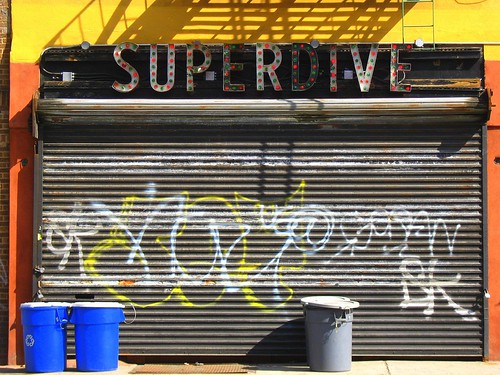 Susan Keyloun 200 Avenue A, earlier this summer.
Susan Keyloun 200 Avenue A, earlier this summer.The owners behind a proposed art gallery and restaurant at the former site of Superdive, one of the most controversial East Village bars in recent memory, will soon formally go before the State Liquor Authority, a spokesman confirmed yesterday. The last time 200 Avenue A was on the radar, Michael Taub, the owner of the building, was met with skepticism by Community Board 3 and Councilwoman Rosie Mendez after pitching the art gallery idea, which would feature a D.J., full service bar and stay open until 4 a.m. on weekends.
Read more…
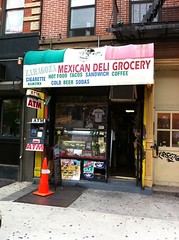 Daniel Maurer
Daniel Maurer The price hike at Café Zaiya wasn’t the only surprise The Local got while stopping into a zed-happy cheap-eats standby yesterday – upon squeezing into the narrow Zaragoza Mexican Deli and Grocery for a spicy beef tongue burrito, we were dismayed to see empty boxes in the coolers where six packs of Estrella Damm beer had recently beckoned. The tables packed near the jukebox in the grocery’s back corner were empty. We were told the taqueria’s beer license had lapsed and a new one was expected shortly. A look at the State Liquor Authority’s Website confirms that the old license expired at the end of July, however a SLA spokesman told The Local that Zaragoza “did not send in for a renewal,” and there is no new license application pending at its address, 215 Avenue A. Which means it may be some time before you can enjoy your carnitas tacos with an ice-cold Negra Modelo again.
This isn’t the only liquor license hiccup the family-operated canteen has faced of late. Read more…
 Nick DeSantis
Nick DeSantis Famed hotelier André Balazs was rewarded for his cameo at Community Board 3’s SLA Committee meeting last night, as the group voted unanimously to support his application to transfer the Cooper Square Hotel’s liquor license to his name.
Mr. Balazs’s high-profile establishments – the Mercer Hotel in Soho and the Standard in the meatpacking district – are magnets for celebrities. His Cooper Square Hotel takeover raised questions that the party atmosphere of the Boom Boom Room (his nightclub in the Standard) could soon migrate to the East Village. But Mr. Balazs ameliorated those fears by addressing residents directly. Read more…
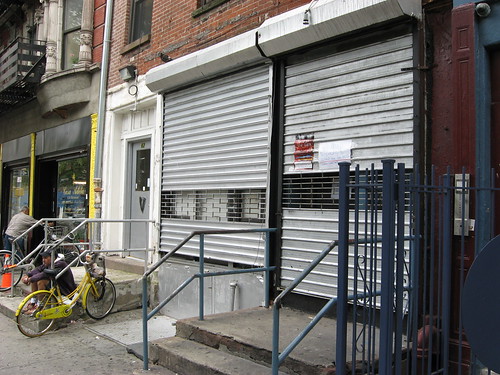 Stephen Rex Brown
Stephen Rex Brown Last week we reported on Nublu’s fight to stay open on Avenue C, despite the State Liquor Authority’s ruling to cancel the nightclub’s liquor license owing to its location less than 200 feet from a Kingdom Hall of the Jehovah’s Witnesses. Now owner Ilhan Ersahin, who is currently traveling, tells us over e-mail, “Our only way to return is to get beer and wine at this point. Our lawyer says it is impossible to get liquor back.” Meanwhile, the comments section of our original post continues to buzz with outrage over the club’s shuttering, though one person, T.M., did defend the move: “People like Ersahin, who laugh in the face of community standards, should just have their license revoked.” The rest of the comments, as you can see below, varied between between praising Nublu and chastising the SLA. Have a different opinion? Throw it into the Chatter Box. Read more…
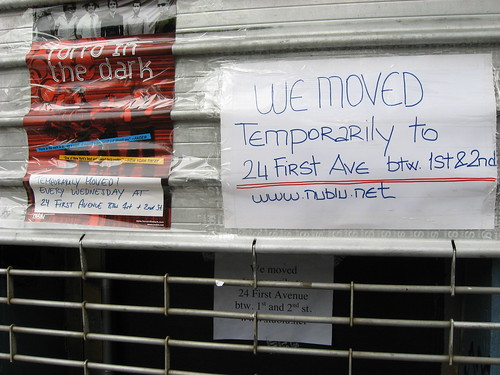 Stephen Rex Brown Signs outside of the shuttered Nublu.
Stephen Rex Brown Signs outside of the shuttered Nublu.Presenting DocuDrama, in which The Local has a look at documents that dramatize goings-on in the neighborhood. Today, a look at Nublu’s fight to reopen at its Avenue C location.
One of the East Village’s last bastions of avant garde music has been forced to leave its home on Avenue C after an anonymous tipster alerted State Liquor Authority investigators to its proximity to a Kingdom Hall belonging to the Jehovah’s Witnesses. Now, Nublu is hosting shows in the basement of Lucky Cheng’s while the owner of the business, Ilhan Ersahin, struggles to find a loophole in liquor laws so that he can return to his original location.
“Really honestly and truthfully, I had no idea that the building across the street was a house of worship until six months ago when I received this letter,” Mr. Ersahin wrote in a letter to the liquor authority in May. (You can see the full letter as well as other documents below.) “I just don’t think it’s fair to blame me for all of this and after nine years in good, willing business.” Read more…
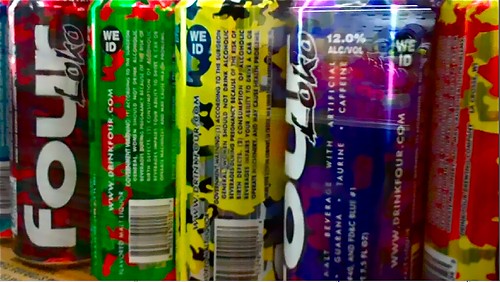 Chelsia Rose Marcius
Chelsia Rose MarciusOur recent posts on bodegas in the East Village that continue to sell caffeinated Four Loko struck a nerve. Many readers took time to write in and express their thoughts on our investigation, and Gothamist picked up the story and republished similar articles twice.
The action wasn’t limited to the blogosphere either: The Local’s Chelsia Rose Marcius revisited the subject after the commotion, reporting that the State Liquor Authority planned to investigate the bodegas in question.
A common label, used both in the comments section and the Gothamist posts, was “narcs” and “snitches.”
“tacony palmyra” started off the name calling:
“Well, thanks East Village Narc! I’m sure the SLA or whatever authority is going to make sure these bodegas you individually identified will be in trouble if they find any, and now we get no more old school Four Lokos. Do journalistic ethics require that you play fun police?”
Read more…
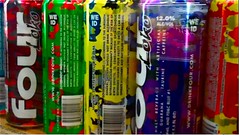 Chelsia Rose Marcius The banned drink was on sale last week.
Chelsia Rose Marcius The banned drink was on sale last week.As we told you last week, The Local found five East Village establishments selling the caffeinated version of Four Loko, the alcoholic beverage banned last year after the New York State Liquor Authority and in-state distributors agreed to stop selling the product.
Officials with the authority said today that they plan to look into the continued sale and distribution of the beverage.
“We’ll have to investigate how this product is still on the shelves,” said William Crowley, a spokesman for the authority. “If someone is selling that stuff illegally, it’s something we’re going to look into.”
Mr. Crowley said that investigation could include examining inventory records to determine where businesses are getting the drink. He said that Four Loko is a small part of distributor inventory, and for wholesalers to continue selling the product to retailers and “take a risk like that would be surprising.”
Store owners found selling the drink face fines ranging from $1,500 to $2,000 and other penalties, including the revocation of their liquor licenses.
Steve Harris, president of the New York State Beer Wholesalers Association, said it is highly unlikely — but not impossible — that retailers are getting the drink from New York distributors who are not a part of the association.
He noted that area businesses could also be “getting it illegally from New Jersey wholesalers or retailers,” or other out-of-state distributors.
“I can tell you unequivocally that none of my members sell the stimulant stuff anymore,” said Mr. Harris, whose group is made up of 44 distributors. “But there is another group of wholesalers that could still have it.”
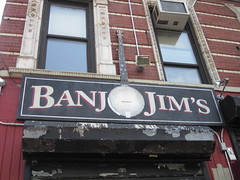 Meghan Keneally The transfer was approved for Banjo Jim’s.
Meghan Keneally The transfer was approved for Banjo Jim’s.The State Liquor Authority Committee of Community Board 3 Monday night endorsed the transfer of the liquor license at Banjo Jim’s, the popular bluegrass bar on Avenue C.
The transfer of the bar’s liquor license was said to be the only issue left to be resolved before the bar was sold to an ownership group led by Robert Ceraso. The next step is for the Community Board to pass along its recommendation to the State Liquor Authority.
The new license allows for acoustic guitar accompanied by microphone amplification and DJs up to two times per week. The hours will remain the same as they are at Banjo Jim’s currently — 5 p.m. to 4 a.m. throughout the week, and then from noon until 4 a.m. on the weekends. Few other details were finalized at Monday’s meeting, except that the signage will change — perhaps unsurprising since Mr. Ceraso has indicated that he will depart from the bluegrass theme and opt for an “artisanal” motif, which may not fit with the large banjo on the current sign over the bar’s front door. The bar’s new doors will be barn-style with glass windows that can be lifted and opened in the summer months.
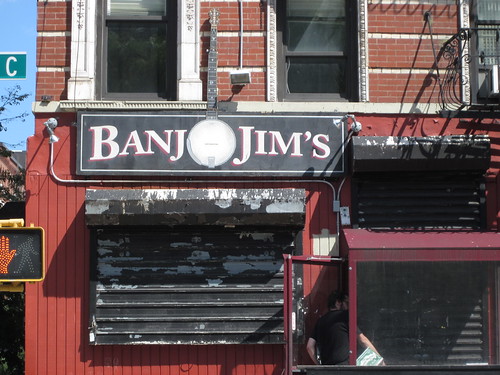 Meghan Keneally. A staple of the East Village music scene, the future of Banjo Jim’s is up for approval.
Meghan Keneally. A staple of the East Village music scene, the future of Banjo Jim’s is up for approval.After the blogger EV Grieve reported that changes may be coming to Banjo Jim’s, a popular bluegrass bar on Avenue C, locals took to their keyboards and headed to the blog’s comments section in anguish.
The bar’s prospective owner, Robert Ceraso, told the blog that he will be presenting a plan to the State Liquor Authority Committee of Community Board 3 tonight asking that the liquor license for the bar be tranferred to he and his partners. In describing his vision for his bar, Mr. Ceraso said that he envisioned it as an “artisanal neighborhood cocktail bar.” And that did him in.
Commenters skewered his use of the word, likening it to buzzwords of trends past, and immediately branded him as one of the big bad developers swooping in to discard the East Village of old.
One commenter, Chris Flash, wrote: “Yet another cool unpretentious music venue lost on the LES, to be replaced by yet ANOTHER yuppie dive, as if Ceraso’s dive will be different from any other dive!!”
Another, Bowery Boogie, said: “Missing Banjo Jim’s already. Artisinal is one of those buzz words that makes me puke every time.”
Mr. Ceraso said that the reaction was not totally unexpected.
“I knew there was going to be some backlash,” Mr. Ceraso said in a telephone interview. “People don’t like change and they turned me into some crazy guy that wants to change the neighborhood.”
Read more…
As we noted earlier, the owners of a proposed business at 200 Avenue A — the former home of the oft-criticized Superdive — are speaking before the State Liquor Authority today. City Councilwoman Rosie Mendez and members of Community Board 3 have both submitted formal letters in opposition to a liquor license for the business, which the applicant says will be an art gallery and restaurant. “The application also includes plans for a full service bar with 12 seats, live acoustic music and a DJ,” Ms. Mendez writes. “It appears that the gallery is incidental to a full service nightlife establishment.”
— Stephen Rex Brown
 Laura E. Lee Board members at a recent meeting.
Laura E. Lee Board members at a recent meeting.After a contentious two-hour discussion in front of more than 100 people, the licensing committee of Community Board 3 took no action regarding a liquor license for Piney Woods, a proposed venue at 34 Avenue A. No majority emerged during three votes on potential resolutions so the committee turned the matter over to be considered by the full board.
The venue is the work of Todd Patrick, an indie music organizer commonly known as Todd P., and Phil Hartman, Two Boots Pizza owner. Mr. Hartman also owned Mo Pitkins, a venue at the same address that closed in 2007. The space ultimately became the bar Aces & Eights in 2009.
Tensions ran high among the crowd gathered for the meeting at the Green Residence on East Fifth Street. At one point, chatter from audience members prompted Alexandra Militano, committee chair, to scold the spectators for “heckling” when opposing viewpoints were presented.
In his opening remarks, Mr. Patrick said the space would bring back some of the neighborhood’s musical and cultural history lost to gentrification.
“We are looking to be a place that harkens back to what brought us all to this neighborhood in the first place, which is the quality artistic legacy of this community,” he said.
Read more…
 Laura E. Lee Participants at tonight’s meeting.
Laura E. Lee Participants at tonight’s meeting.The State Liquor Authority Task Force of Community Board 3 approved a resolution tonight that clarifies the terms under which liquor licenses can be transferred when bars and restaurants are sold in the East Village.
The action, which will go to a vote of the full board at its next meeting, allows for “grandfathering” — a process in which the buyer of a business is allowed to assume the license owned by the seller, provided that the business had its license prior to June 28 and other criteria are met.
Before tonight’s meeting, it was unclear how policy changes enacted by the full community board in February would affect applicants who requested a “grandfathered” transfer.
The “grandfathering” provision is not used by other community boards, according to Susan Stetzer, the district manager of Community Board 3. But Community Board 3 allows businesses to apply as transfers, provided they meet other criteria like being deemed responsible business owners — a status evaluated by a review of liquor authority reports, police violations and complaints to the 311 city services information hotline.
Read more…
The State Liquor Authority Committee of Community Board 3 Monday night refused to endorse a liquor license for a proposed music and restaurant space on Avenue A. With the 4-3 vote, the committee turned aside a proposal to open a new Mexican restaurant and lounge at 34 Avenue A. The proposal had been submitted by several owners, including Phil Hartman, who owns Two Boots Pizza and a former venue, Mo Pitkin’s House of Satisfaction, and the music promoter Todd Patrick; the fate of the project is unclear. —Hadas Goshen









